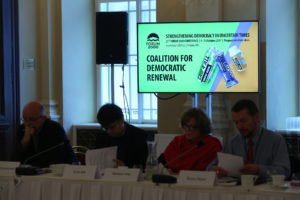 It is not enough to simply moan about the state of democracy in the western world; we badly need tangible actions and innovations to fix the challenges too. One option is to use technology (as Seth Flaxman‘s Democracy Works is doing), The FT’s Gillian Tett observes:
It is not enough to simply moan about the state of democracy in the western world; we badly need tangible actions and innovations to fix the challenges too. One option is to use technology (as Seth Flaxman‘s Democracy Works is doing), The FT’s Gillian Tett observes:
“Our systems are 18th-century systems and the states are notoriously underfunded, so there is no organisation in this country which has an incentive to help all voters vote in all elections,” explains Flaxman, who … argues that “low turnout undermines democracy — it creates a power vacuum and a weak [political] immune system”. …
 However, on the optimistic side of the ledger, Flaxman believes that if he, and others, can raise the participation rate (using a free online tool called TurboVote}, they might be able to create a healthier climate. “With high participation, it changes incentives for all politicians to be focused on serving the public and not just a slice of voters . . . and it is harder to have disinformation campaigns work . . . or change the outcome by just putting in a lot of money.”
However, on the optimistic side of the ledger, Flaxman believes that if he, and others, can raise the participation rate (using a free online tool called TurboVote}, they might be able to create a healthier climate. “With high participation, it changes incentives for all politicians to be focused on serving the public and not just a slice of voters . . . and it is harder to have disinformation campaigns work . . . or change the outcome by just putting in a lot of money.”
The world will continue to see four major challenges to democracy in 2020, says Sook Jong Lee, a Senior Fellow at South Korea’s East Asia Institute:
- First, authoritarian states will keep up their oppression of media and civil society, she writes for a recent Council on Foreign Relations symposium. The Chinese government’s harsh reaction to the ongoing revolt in Hong Kong and the landslide victory for pro-democracy parties in District Council elections last month deserves great attention. Media suppression in Hungary, Russia, and Turkey is also likely to continue.
- Second, attacks against certain ethnic or religious minority groups will persist. State-sponsored violence, such as in the Rohingya crisis, has mostly abated, but lone-wolf hate crimes show no sign of decline.
- Third, political polarization is weakening institutions in advanced democracies. …. Free elections alone will not create the common ground within societies that is critical for a healthy democracy; there must also be political compromise.
- Fourth, both states and individuals are exploiting digital technology to spread disinformation and incite populism. Wise regulations are needed to curb this worrisome trend.
Moral revolution democratized
But there are also more old-fashioned ways to boost civic fabric, The FT’s Tett adds.
 For example, as the European Hub for Civic Engagement notes, the International Civil Society Centre @ICS_Centre is working with CSO partners to develop a new playbook for solidarity and cooperation, to be able to better respond to the clampdown, to be better prepared and to push back to the boundaries of what civil society restrictions have come to be.
For example, as the European Hub for Civic Engagement notes, the International Civil Society Centre @ICS_Centre is working with CSO partners to develop a new playbook for solidarity and cooperation, to be able to better respond to the clampdown, to be better prepared and to push back to the boundaries of what civil society restrictions have come to be.
Darkest before dawn?

21st Forum 2000 Conference
There are three fundamental things that need to be done to renew democratic progress and momentum, the National Endowment for Democracy’s Carl Gershman contends:
- The first is to acknowledge – and try to reverse – the authoritarian resurgence….
- The second priority is to restore U.S. leadership in the defense of the liberal world order that is so essential for democratic progress, economic growth, and political stability in the world. …
- The third priority is to think about how we can restore our country’s sense of its purpose in the world and to reaffirm the American founding values that have done so much to influence the growth of democracy in the world….
 Social scientists say times of crisis hold hope for change, renewal and rebirth, writes Salon’s Paul Rosenberg.
Social scientists say times of crisis hold hope for change, renewal and rebirth, writes Salon’s Paul Rosenberg.
“Difficult times also carry within them a promise of renewal, of a genuine change for the better,” notes one analyst. Broadly speaking, the idea of renewal through adversity is anything but new, Rosenberg adds. But as that long history suggests, it’s an idea that evolves and develops over time, incorporating new understanding and at times even undergoing renewal through adversity itself. But there are signs, at least, of stirring democratic renewal. RTWT







